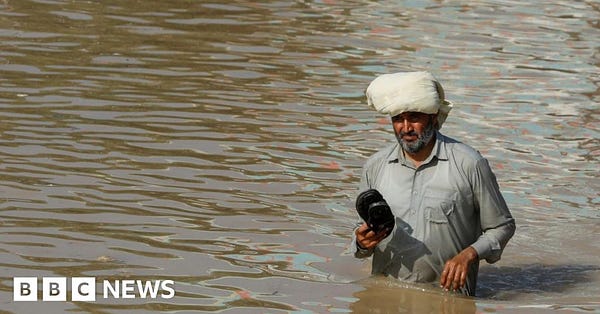Destabilized Saturday Edition #33
Calamity in Pakistan, Roe reversal ripples, salami and authoritarian takeovers, they don't have hotdogs in Colorado
Several recent developments worth noting:
The catastrophic flooding in Pakistan is on another level. 33,000,000 people have been affected, more than live in Texas and Oklahoma combined. Pakistan’s population is 235,000,000, so the floods have affected 14 percent of the people in the fifth largest country in the world. Climate migration will accelerate from here.
There’s still so much flooding around the world it’s nearly impossible to keep track of.
Many of the 150,000 residents of Jackson, the capital of Mississippi, currently have *no running water at all*, and those who do can’t drink it without boiling it first. The crisis is the result of the state neglecting the water infrastructure in the majority Black city, and an extreme flooding event last week. It’s another example of cascading instability. It may also be (I want to understand it more thoroughly before drawing a conclusion) an example of why red states are a bad bet in the era of climate transformation.
Between the Inflation Reduction Act (climate bill), the CHIPS Act to reshore critical semiconductor manufacturing, the bipartisan gun control bill, and the ongoing pushback against Dobbs (Roe reversal), American politics has had a good summer, but the major television networks not carrying President Biden’s prime time speech about the threat to our democracy is discouraging. (The CBC showed it in Canada.)
Democratic political analyst (and, full disclosure, my friend and former boss) Tom Bonier has been tracking new voter registrations and found that they surged after Roe was repealed:



There’s more state specific data, including breakdowns by age and party, in Tom’s timeline. To be clear, these changes are all on the margin and none of this guarantees anything at all (a registration is not a vote). But this data supports the hypothesis that because of the universal and personal nature of abortion, the reversal of Roe will increase political engagement among young people and women.
My Work
The secret to buying a home that will hold its value
The climate crisis is going to inflict significant changes on the world in the coming years as its direct impacts and second-order effects grow in magnitude. As market participants (people) begin to recognize this, assets that are rugged against climate change will grow in value, while those that are vulnerable to climate impacts will decline. This coming climate repricing is straightforward, but its implications are massive and not widely understood.
Interesting Reads
“Successful democratic backsliding requires careful management of the backlash that can occur in response to it. This is the case everywhere, but it is particularly important in the United States, where democracy is fundamental to national identity. An optimal strategy for a government that attempts an authoritarian takeover would be to do so in a way that is not easily detectable.”
[Arturas Rozenas, a professor of political science at N.Y.U.] suggested that the best strategy is the adoption of “the ‘salami tactic’”:
“You take a small step, the consequences of which to democracy are ambiguous — change election laws, voter-registration rules, increase partisan control of the Civil Service or weaken the independence of the judiciary. Many of the changes will be too gradual to cause a reaction, but in aggregate they will confer enough advantage for the incumbent to make it impossible for the opposition to win.”
Tweets of the Week






Extreme Weather Watch


Creeping Authoritarianism Watch


















